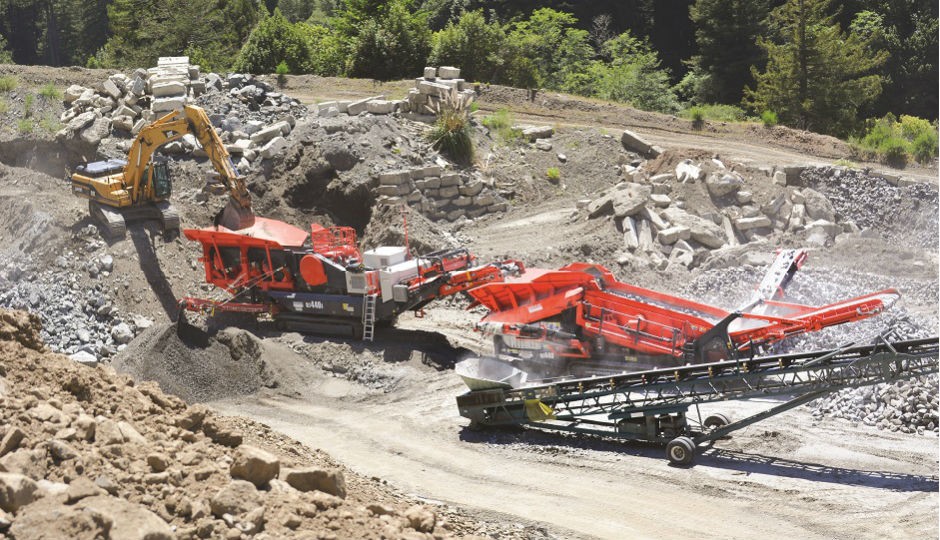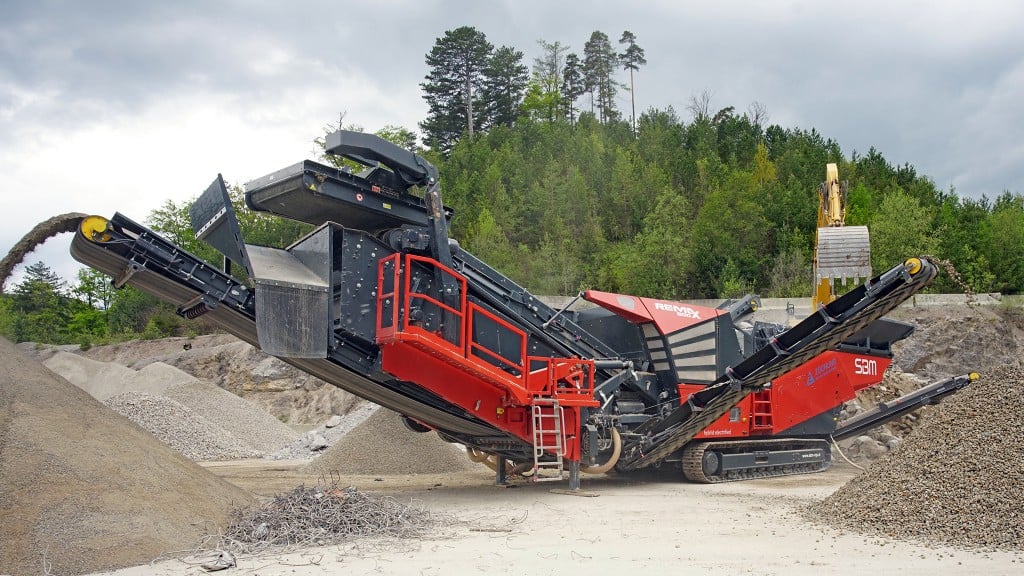
When a quarry operator acquired a second property in 2014 to penetrate the market for rip rap by producing sub-base and erosion control material, their reputation for operating with optimal efficiency was on the line. It was essential to get the right primary crusher, one that could handle heavy-duty quarrying applications easily and for many years.
The dilemma was resolved when the family-owned company, Canyon Rock, learned about the Sandvik UJ440i mobile jaw crusher. “The UJ440i is a step up: the chassis, the frame, the belt – everything is sturdier,” said Canyon Rock co-owner Jonathan Trappe. “We were looking for something that would last a lot longer than a regular contractor’s primary jaw, something that would run well and last for 15 to 20 years.”
That the UJ440i crusher can efficiently turn out two finished products from the quarried rock was a deal-clincher. “The jaw can handle major openings,” said Trappe. “We can open it up and make finished rip rap. Other jaw crusher manufacturers say the jaws can be opened to eight inches, but even that is pushing it.” Its jaw size, 48 inches by 32 inches, is capable of reducing large volumes of rock at high rates of production – up to 700 metric tons per hour. The close side setting can be hydraulically adjusted at the touch of a button, and the opening can be reduced right down to four inches from 11 inches.
Its conveyor belts are a full 54 inches wide and ride-on hydraulic drive units that can be reversed as needed. A 300-gallon fuel tank ensures the crusher can process rock all day without interruption for fuelling. Yet when quickly interrupting the operation is required, emergency stop buttons are located at several appropriate places on the frame of the machine, which is important to safety conscious Canyon Rock executives.
Its 425-hp Volvo 3B diesel engine directly drives the crushing processes without critical loss of power, while consuming only about eight gallons of fuel per hour. “The fuel consumption on the Volvo engine is absolutely phenomenal,” said Martin Keegan of Interval Equipment. “We saw one working in Europe on our factory visit and even when the customer changed the close side setting on the jaw from six inches down to three inches on a very hard competent granite, the fuel consumption only jumped by half a gallon an hour. I have never seen such a productive unit compared to the fuel consumption.”
Visit to Sandvik plant in the U.K. helps cement the deal
Sandvik flew the two Trappe brothers, Jonathan and James, to the U.K., where two of the three company owners saw the UJ440i mobile jaw crusher in action. “It meant a lot to receive an invitation from Gareth Orritt to tour a Sandvik factory,” Jonathan Trappe said. Orritt is business line manager for Sandvik.
“We met with the engineers who designed the UJ440i,” Jonathan Trappe added. “It was key for us to see one in action and after seeing how well one was running after 10,000 hours of operation, we knew that was what we were looking for.
“The pre-screen sold us on it; the Trend model with the bigger screen, so we could make legitimate splits of the rock material.” The separate pre-screen is located between the pan feeder and the crushing chamber and measures 45 inches by just under seven feet. It is topped by the stepped grizzly section with a maximum aperture of four inches.
“The pre-screen on the UJ440i Trend is a superb addition for eliminating the fines quickly,” said Orritt. “Because of the large screening capacity up to 150 tph and the large screening area, it ensures that Canyon Rock put only clean rock into the jaw which allows the screening plant further down the line to be so much more efficient in making the coarse rip rap products that Canyon Rock need to supply their customer base.”
Mobile was definitely the way to go. Not only can the jaw crusher follow the contour of the quarry face as the quarry is blasted away but also it is essential somewhere where limitations on the permits will see the bottom of the quarry drop down. “Although the UJ440i is much larger and heavier, we did need a mobile machine,” Jonathan Trappe said. The 74-metric-ton crusher is easily transported as a single unit on 20-inch wide, 14-foot long crawler tracks, and can pull its way up a 20-degree slope.
From a small quarry to a full-service operation
The Trappe family got into quarrying as a sideline to its dairy business, which began operating 70 years ago. From a small quarry on the dairy farm, the Trappes hauled occasional truckloads of rock to larger quarry companies.
In 1972, the family began digging rock seriously when it bought an operating quarry, which is managed now by Jonathan Trappe. That open excavation site is a full-service operation featuring a complete line of aggregate and recycled material, and an auxiliary division offering ready-mix and concrete products.
Their purchase of the Cazadero property instantly created the need for a machine that could produce rip rap. The Trappes quickly thought of Sandvik.
Wendell Trappe had long been familiar with Allis- Chalmers aggregate equipment and considered them “good crushers” (Sandvik subsequently purchased and upgraded the Allis Minerals product line, later named Svedala). The family had already purchased a Svedala H4800 cone crusher and a Sandvik CH660 cone.
After falling in love with the UJ440i, the company also bought a Sandvik QE440 mobile scalping screen unit to enhance the two-product output at Cazadero. The QE440 boasts the largest total scalping area in its class and features three broad, hydraulic, material conveyors with high discharge heights for major stockpiling. It can produce up to 900 metric tons per hour.
“We are really happy with the QE440,” said Jonathan Trappe. He acknowledged that the family wasn’t sure if the machine would be able to handle larger rocks conveyed to it by the crusher. “But it handles the tonnage the UJ440i gives it with no problem, and has enough throw to clear itself.”
Parts not a problem
“We were worried that parts would be a problem,” said James Trappe, who manages the Cazadero dig. “When something goes down, we can’t be shut down for a couple of weeks waiting on a part. Having a dealer who will stock parts and take care of issues that might come up was important.”
Fortunately, Canyon Rock has long-standing relationships with mobile equipment from Sandvik. The Trappes first worked with Martin Keegan of local mobile crushers and screeners dealer Interval when he was a representative for Extec, which Sandvik bought. Not only was it important to trust the knowledge and support of somebody with experience in the industry, but also getting the after-sales backup once the machines were running.
Being able to efficiently churn out rip rap in volume is what drove the purchase of both of the new machines, said Jonathan Trappe. Thanks to Sandvik, Canyon Rock now has the critical pieces of equipment in place to meet urgent demand for the coarse rock.



